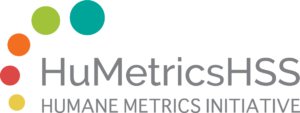Lindsay Yotsukura, University of Maryland, College Park
The HuMetricsHSS Fellowship has enabled me to act as a catalyst behind the scenes to foster the development of many short- and long-term collaborations within and beyond the School of Languages, Literatures, and Cultures (SLLC) at the University of Maryland, College Park (UMD) that support values-enacted approaches to research, teaching, and service.
In particular, an initial brainstorming session with Bonnie Thornton Dill (former Dean of our College of Arts and Humanities, and foundational member of the HuMetricsHSS team) and Trevor Parry-Giles (also a HuMetricsHSS fellow at UMD) about the untapped potential for curriculum development grants for faculty fortuitously coincided with campus administrators’ plans to launch two major university-wide grant competitions in Spring 2022: Teaching and Learning Grants 2022 – Experiential Learning and UMD’s Grand Challenges Grants.
Thanks to the Teaching and Learning initiative, several faculty members in the SLLC garnered six grants to “reimagine learning”:
- Language Learning for Multilingual Societies: Experiential Learning and Project Based Curricula (PI: Manel Lacorte, Department of Spanish and Portuguese)
- Special Topics in World Cultures; The Art of Dissent: Aesthetics, Politics, and Civil Disobedience (PI: Cynthia Martin, Department of Russian)
- Spanish at Work – Internships and experiential learning modules for Spanish in the Professions (PI: Elisa Gironzetti, Department of Spanish and Portuguese)
- Chinese Language Partnerships for CHIN 101 and CHIN 301 (2 separate grants; PI: Minglang Zhou, Department of East Asian Languages and Cultures/Chinese)
- Gender-Inclusion in the Foreign Language Class (PI: Avital Karpman, Joseph and Rebecca Meyerhoff Program and Center for Jewish Studies, and the Hebrew Language Program)
In addition, Juan Uriagereka (Linguistics/SLLC) and Kira Gor (Second Language Acquisition/SLLC) partnered with multiple UMD departments and colleges as well as Morgan State University and numerous Maryland public school systems to propose a winning institutional Grand Challenges Grant in the amount of $3 million called Maryland Initiative for Literacy and Equity (MILE).
Both grant initiatives are directly tied to the University of Maryland’s new Strategic Plan, which is entitled “Fearlessly Forward: In Pursuit of Excellence and Impact for the Public Good.” In the process of developing their successful grant applications, our SLLC faculty were able to demonstrate how integral their teaching, research and service are to reimagining learning on campus and to positively impacting local and global communities. Their projects truly embody the values-enacted approaches advocated by HuMetricsHSS. I therefore feel fortunate to have participated as a HuMetrics Fellow at a time when significant campus attention and resources have been dedicated to supporting such initiatives. This has made the work I set out to do in my own fellowship project far easier. I have also benefited tremendously from the bimonthly Zoom sessions with the HuMetricsHSS fellows, since their projects have inspired me to continue to “fight for what is right” here on campus.
Other partnerships and new initiatives I have helped to foster during the period of my fellowship that are directly connected to my initial HuMetricsHSS proposal include deepening connections between the Language House (UMD’s oldest Living-Learning Program), the Language Partner Program (“LPP”, a collaborative program between the SLLC and the Office of International Student & Scholar Services), weekly Language Chats, and UMD’s Education Abroad Office by:
- developing a “badging” (micro-credentialing) program for students to demonstrate linguistic and cultural competence by combining Language House residency, LPP participation, study abroad, and various extracurricular activities related to language learning and community engagement through the development of an e-portfolio that can be shared on LinkedIn and other platforms;
- inviting international exchange students to live in the Language House for a semester or year while they are on the UMD campus, so that learners residing there will have more frequent opportunities to interact in the target language they are studying;
- developing a one-credit course for Language House residents to integrate the language and culture-related activities they participate in throughout the semester and connect more directly to other experiential learning opportunities on campus and in local communities;
- hosting Language Chats and the two full-class sessions for LPP on the same dates and in the same shared Language House space to increase awareness among participants about both programs.
Reflecting on the period of my fellowship overall, I certainly feel blessed to have undertaken this work on a campus that has been so supportive of these various initiatives. Beyond the specific work I proposed to do through my fellowship, this period has also been thoroughly rejuvenating in that it has spurred me to serve as an active/activist liaison between the SLLC, the College of Arts and Humanities, and the campus at large. It is common on our campus for faculty and staff to refer to the “siloed” nature of departments and offices. But through my position as Associate Director for Academic Affairs in the SLLC over the past 3 years, I have opted—sometimes by necessity, sometimes by choice—to reach across departmental and college boundaries to participate in discussions around the values held by this university that have significant repercussions for our work as faculty members at UMD. These discussions have brought additional opportunities to inform others on our campus about the role and importance of the SLLC’s mission in educating students, and in connecting more meaningfully with the campus, local communities, and the world at large.
While there have certainly been challenges along the way, I am grateful for the fortuitous, coincidental timing of the HuMetricsHSS fellowship, our campus grant initiatives, and my 3-year term as SLLC Associate Director. Change may come slowly, but I am better equipped now to more successfully navigate campus channels and seek a more fulfilling and engaged life as a faculty member at UMD in the years ahead.
